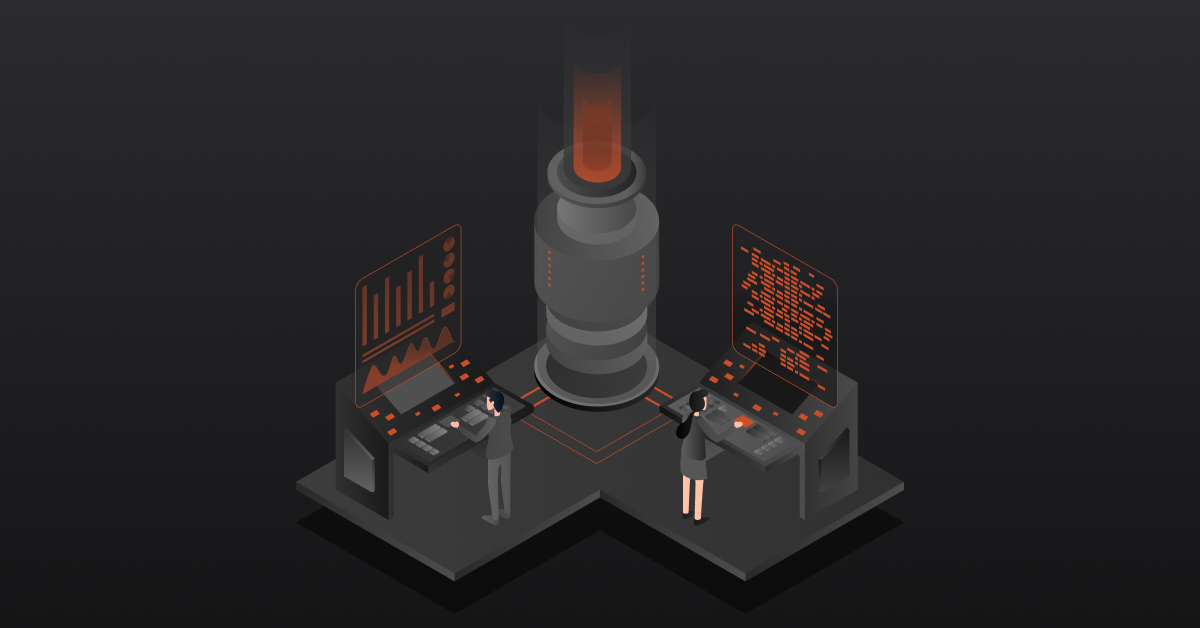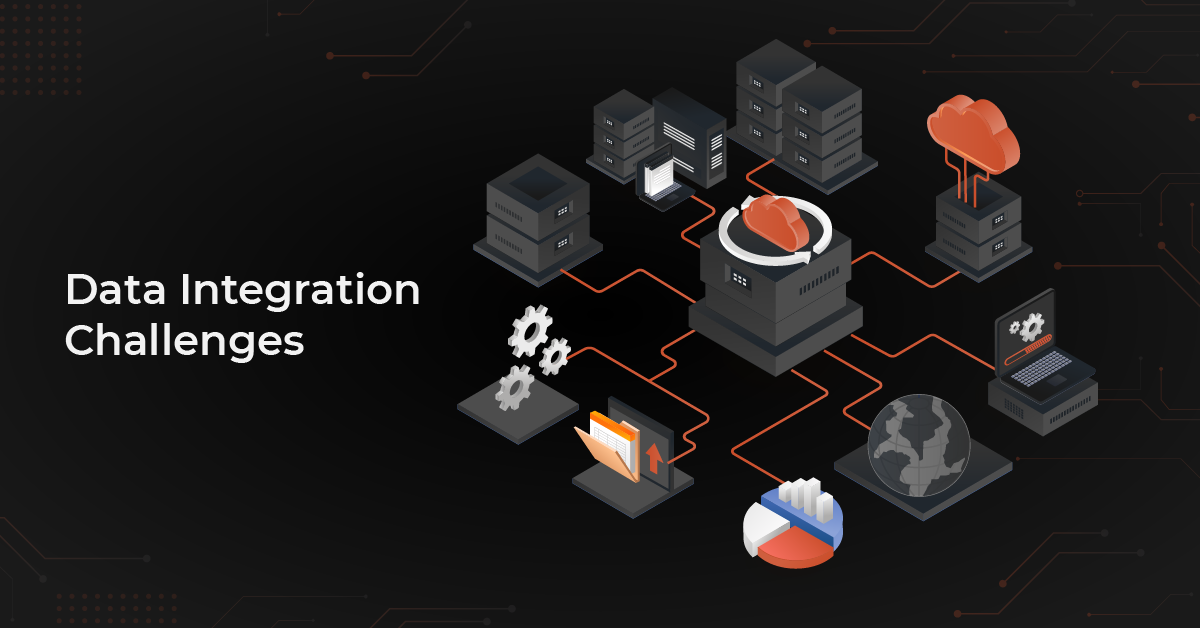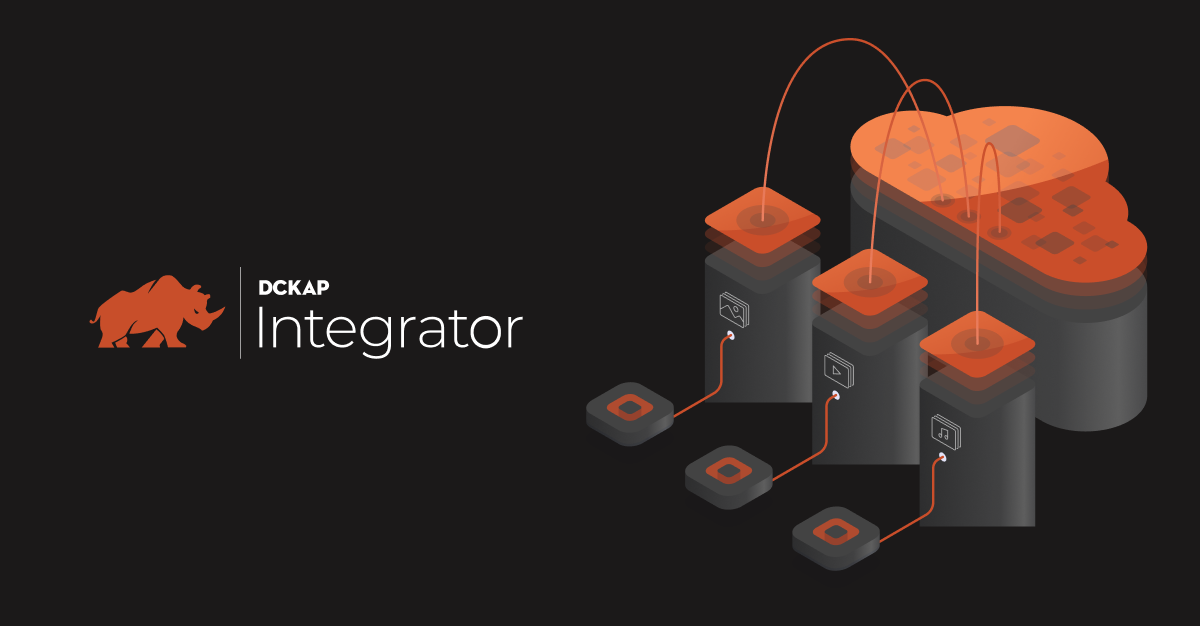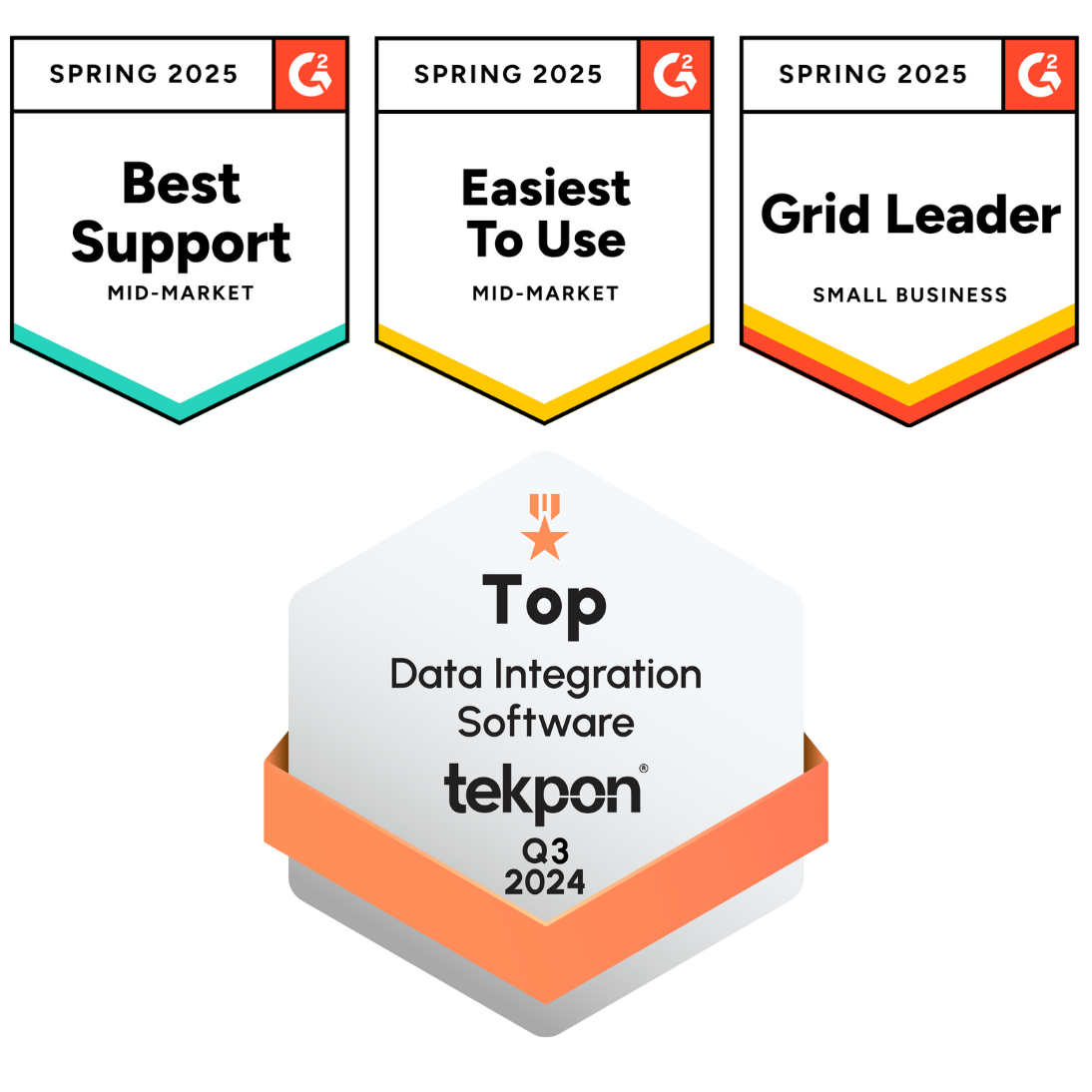Managing multiple business applications, like your ERP, CRM, eCommerce, and supply chain systems, demands seamless data exchange across your entire network. Without integration, information silos slow down business processes, delay orders, and increase system maintenance.
Two options before distributors, especially those who use Infor products, include DCKAP Integrator and the Infor ION platform, a key part of Infor OS. DCKAP provides an easy, ERP-first way to automate tasks, while Infor ION (Infor Intelligent Open Network), built on open-source technologies, uses ION Grid, Event Management, and Infor ION Process to enhance communication and control across Infor systems.
This article outlines their core features, and pros and cons, to help you find the best match for your needs.
Overview of the Platforms
| Feature | DCKAP Integrator | Infor ION |
| Ideal for | Flexible, multi-system integrations | Connecting products in the Infor Suite |
| Architecture | API-first, low-code, cloud-native | Middleware-based, event-driven |
| Pre-Built Connectors | Broad, supports third-party apps | Extensive for Infor ecosystem |
| Customization | Moderate, low-code flexibility | High, requires technical expertise |
| Deployment Time | Faster, business-user friendly | Longer, consultant support often required |
| Monitoring | Real-time dashboards with alerts and automated retries | ION Desk & Pulse dashboards |
| Scalability | Cloud-native, flexible, easily scalable | Enterprise-grade, suited for complex workflows |
| Integration Scope | Multi-platform, versatile for hybrid setups | Best within the Infor ecosystem |
| Error Handling | Automated alerts and retry mechanisms | Built-in, complex configuration |
| Analytics | Limited built-in, relies on connected systems | Integrated with Infor Birst |
| Rating | Gartner: 4.8/5 – 14 Reviews G2: 4.7/5 – 54 Reviews | Gartner: 4/5 – 6 Reviews G2: 3.5/5 – 3 Reviews |
Infor ION: Enterprise-Grade Integration
Infor ION (Intelligent Open Network) is designed primarily for organizations using Infor’s suite of applications. It is middleware-based, offering event-driven integration to connect multiple systems, automate workflows, and provide actionable insights.
Key Features:
- Event-Driven Architecture: Real-time updates across connected systems.
- Pre-Built Connectors: Simplifies integration with ERP, CloudSuite, LN, M3, and other Infor and third-party applications.
- Workflow Automation: Automates multi-step processes such as approvals, notifications, and exception handling.
- Monitoring Dashboards: ION Desk and Pulse dashboards provide centralized visibility.
- Analytics Integration: Works with Infor Birst to derive operational insights.
- Scalability: Supports large, complex enterprise environments.
Ideal Users: Enterprises heavily invested in Infor products seeking deep integration and enterprise-grade reliability.
User feedback:

DCKAP Integrator: ERP-First Integration For Distributors and Manufacturers
DCKAP Integrator is a cloud-based, low-code platform that connects ERPs, eCommerce platforms, CRMs, and other enterprise applications. Its focus is flexibility, rapid deployment, and ease of use, making it accessible to business teams without deep technical expertise.
Key Features:
- ERP-First Integration: Integrations that place the ERP at the heart of the set up, allowing users to easily connect any system to each other.
- Broad Integration Support: Compatible with SAP, Epicor, Shopify, BigCommerce, Sage, Infor, Salesforce, and more.
- Real-Time Synchronization: Ensures data is always up-to-date across platforms.
- Error Handling & Alerts: Automated notifications for failed processes.
- Cloud-Native Scalability: Easily grows with business needs.
- Pre-Built Templates: Accelerates common integration scenarios such as order syncing and inventory updates.
Ideal Users: Mid-sized businesses or enterprises with hybrid platforms requiring quick, flexible, multi-platform integration.
User feedback:
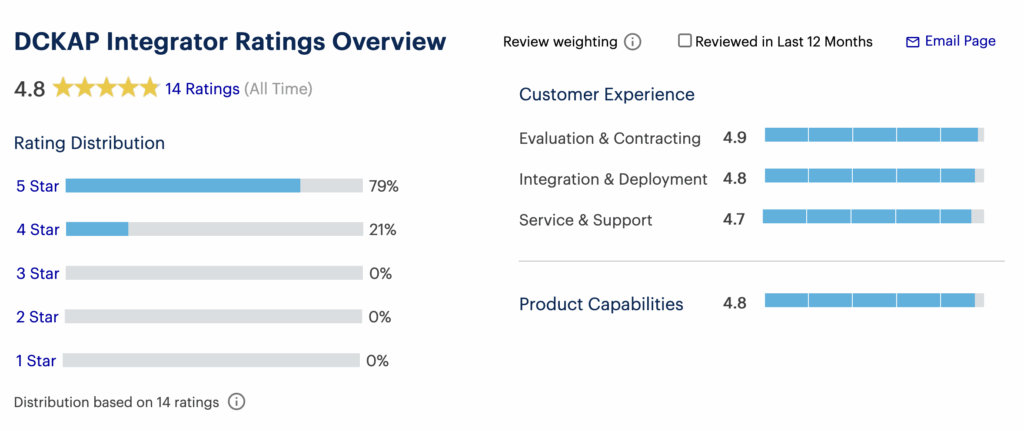
Ease of Use and Implementation
DCKAP Integrator
- User-Friendly Interface: Drag-and-drop design allows business teams to manage integrations with minimal IT support.
- Fast Deployment: Pre-built templates reduce setup time significantly. Set up can also be handled by DCKAP’s integration experts in weeks instead of months.
- Highly customizable: Integrations can be customized for the businesses’ specific needs and requirements by the team.
- Deployment Duration: Days to weeks, depending on the number of systems connected.
Infor ION
- Complex Setup: Often requires XML configuration, message queues, and workflow definitions.
- IT Dependency: Deployment and maintenance typically need certified consultants or internal IT specialists.
- Learning Curve: Non-technical users may find dashboards and configuration challenging.
- Deployment Duration: Large-scale implementations can take weeks to months.
Pros and Cons
DCKAP Integrator
Pros:
- Rapid deployment and setup
The platform allows faster integration deployment through pre-built connectors and intuitive mapping tools. Businesses can connect ERP, CRM, and eCommerce systems within hours, not weeks, minimizing downtime and accelerating time-to-value. - Cost-effective subscription pricing
DCKAP Integrator follows a flexible subscription-based pricing model, which keeps total cost of ownership low. Organizations can scale integrations as they grow without worrying about hidden costs or heavy licensing fees often seen in enterprise integration tools. - Broad integration support across platforms
With its extensive integration capabilities, DCKAP Integrator supports seamless data exchange between ERP, CRM, PIM, and eCommerce platforms. It’s designed to handle multi-system environments, making it ideal for businesses operating on multiple technologies. - Real-time error alerts and automated retries
The platform’s real-time monitoring and alerting system ensures that integration errors are detected instantly. Automated retries and notification mechanisms keep business operations running smoothly, improving reliability and reducing manual intervention.
Cons:
- Less advanced analytics built-in
While DCKAP Integrator provides essential performance insights, it lacks the depth of advanced analytics offered by larger enterprise suites. Businesses requiring extensive process intelligence or predictive dashboards may need external BI tools. - Limited for highly complex enterprise workflows
For large-scale enterprises with deeply nested workflows, DCKAP Integrator’s low-code approach may hit limitations. It’s best suited for medium to moderately complex integration scenarios rather than massive, multi-tiered ecosystems.
Infor ION
Pros:
- Enterprise-grade integration for complex workflows
Infor ION is built as a robust enterprise integration framework capable of managing intricate data flows across departments, systems, and global subsidiaries. It’s ideal for large organizations with complex operational dependencies. - Deep analytics and monitoring tools
Infor ION includes advanced analytics and process monitoring capabilities that give organizations detailed visibility into system performance and data movement. These tools help identify bottlenecks and optimize end-to-end workflows. - High reliability and security
The platform ensures enterprise-level reliability with built-in redundancy, encryption, and compliance features. This makes it a preferred choice for regulated industries where data integrity and security are top priorities.
Cons:
- Limited flexibility outside Infor ecosystem
Infor ION excels within its own ecosystem but offers limited flexibility when connecting with third-party or custom applications. Businesses with hybrid tech stacks might find this restrictive compared to low-code integration platforms like DCKAP Integrator. - Complex and time-consuming setup
Deploying Infor ION integration software often requires specialized expertise and longer setup times. The configuration process can be complex, especially when integrating non-Infor systems. - Higher upfront costs
Unlike subscription-based models such as DCKAP Integrator, Infor ION involves higher initial investment and licensing fees. This can make it less accessible for small or mid-sized businesses. - Steep learning curve for non-technical users
The platform’s advanced configuration and analytics tools are designed for IT professionals. Non-technical users may find it challenging to navigate, requiring ongoing support or training.
User Reviews and Feedback
Real user experiences often reveal what specs and features can’t. The following Gartner Peer Insights reviews highlight how customers rate DCKAP Integrator and Infor ION across functionality, ease of use, and business impact.
Pricing Considerations
DCKAP Integrator
DCKAP Integrator follows a subscription-based, modular pricing model that allows businesses to pay only for the integrations they need. This makes it particularly appealing for small to mid-sized companies looking to scale gradually without heavy upfront investments. The flexible structure helps organizations manage costs while maintaining access to continuous updates, support, and platform enhancements.
Infor ION
Infor ION, typically licensed as part of the Infor CloudSuite, involves higher initial costs and may include consulting or implementation fees depending on deployment complexity. However, it offers long-term value for large enterprises that prioritize enterprise-grade reliability, advanced data governance, and deep native integration across the Infor ecosystem.
Which Platform Should You Choose?
Choosing between Infor ION and DCKAP Integrator depends on your organization’s size, technical infrastructure, and integration needs.
- DCKAP Integrator is ideal for:
- Mid-sized businesses or growing enterprises with hybrid systems
- Organizations seeking fast deployment, low-code flexibility, and ease of use
- Businesses needing real-time integration across multiple platforms with minimal IT dependency
- Mid-sized businesses or growing enterprises with hybrid systems
- Infor ION is ideal for:
- Large enterprises heavily invested in Infor applications
- Organizations requiring deep workflow automation and analytics
- Businesses prioritizing enterprise-grade security and reliability
- Large enterprises heavily invested in Infor applications
Bonus Tip: Decision-Making Framework
- Assess Current Systems: Identify your ERP, CRM, eCommerce, and supply chain platforms.
- Define Business Priorities: Decide whether deep analytics, enterprise reliability, or rapid deployment is more critical.
- Evaluate Technical Resources: Determine whether your team has the skills to handle complex setups or prefers low-code solutions.
- Estimate Budget and ROI: Compare licensing, implementation, and operational costs.
- Plan for Scalability: Consider future integration needs as your business grows.
By carefully evaluating these factors, businesses can select the platform that ensures accurate data flow, automated processes, and operational efficiency.
Final Thoughts
Both DCKAP Integrator and Infor ION deliver strong integration capabilities, yet they cater to different organizational needs. DCKAP Integrator emphasizes agility, ease of use, and broad multi-platform support, making it ideal for businesses seeking rapid, flexible integration with minimal IT overhead.
Infor ION shines in Infor-centric, enterprise-scale environments, offering deep integration, advanced analytics, and centralized control—but often requires greater technical investment and resources.
Ultimately, choosing the right platform is less about which is “better” and more about how well its strengths align with your organization’s size, business processes, workflow complexity, and long-term integration strategy. The best solution is the one that fits your ecosystem today while remaining adaptable for future growth.
Frequently Asked Questions
What is the main difference between DCKAP Integrator and Infor ION?
DCKAP Integrator is a low-code, subscription-based integration platform ideal for multi-platform setups and mid-sized businesses. Infor ION is an enterprise-grade integration solution, tightly integrated with Infor CloudSuite, offering advanced analytics and workflow management for large organizations.
Which platform is more cost-effective for small and mid-sized businesses?
DCKAP Integrator typically offers modular subscription pricing that scales with business needs, making it more affordable for smaller organizations or those with mixed technology stacks. Infor ION usually involves higher upfront costs and consulting fees, suited for enterprise-scale deployments.
Can DCKAP Integrator and Infor ION integrate with multiple business applications?
Yes. DCKAP Integrator supports a wide range of ERP, CRM, eCommerce, and other business applications, while Infor ION excels in Infor-centric ecosystems but also supports integration with third-party systems through its ION Grid and Infor ION Process capabilities.
How do the platforms handle real-time data and error management?
DCKAP Integrator provides real-time error alerts and automated retries to keep workflows running smoothly. Infor ION uses Event Management and monitoring dashboards to track data flows, ensuring reliability and centralized oversight across complex enterprise systems.


